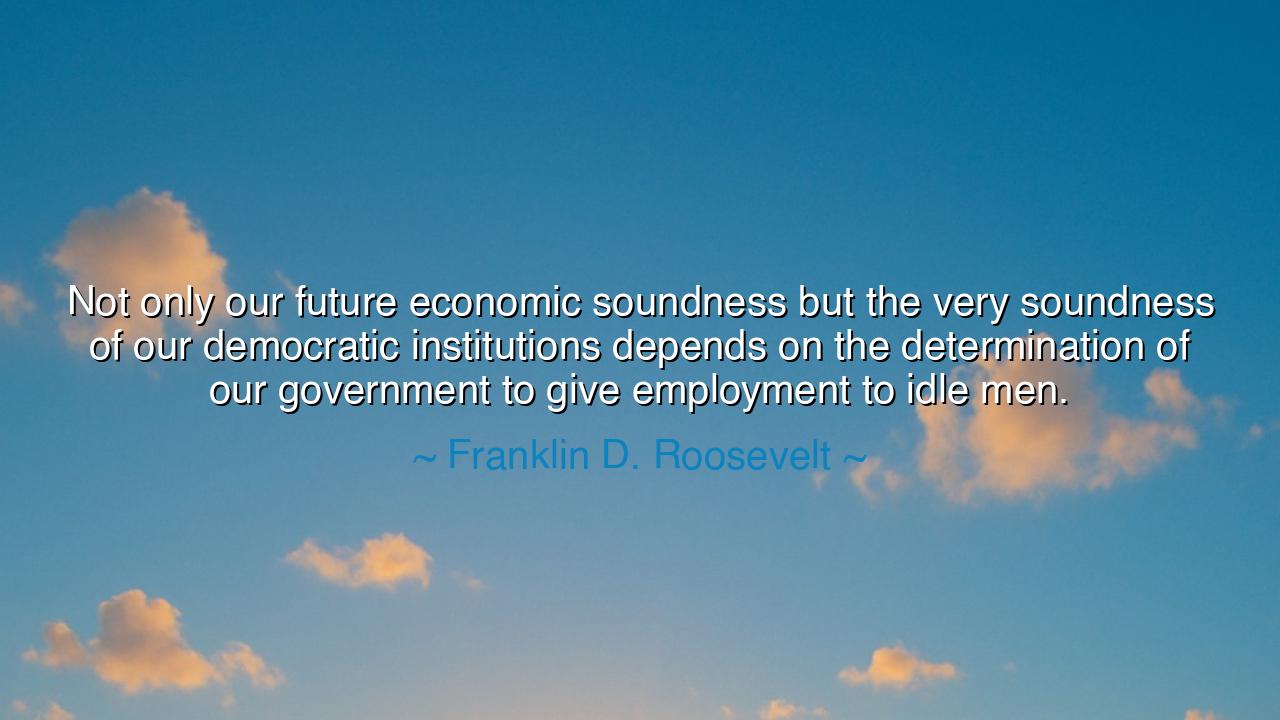
Not only our future economic soundness but the very soundness of
Not only our future economic soundness but the very soundness of our democratic institutions depends on the determination of our government to give employment to idle men.






"Not only our future economic soundness but the very soundness of our democratic institutions depends on the determination of our government to give employment to idle men." These words spoken by Franklin D. Roosevelt ring with an urgency that speaks to the very heart of society's stability. Roosevelt, in the midst of the Great Depression, understood that the economic health of the nation and the strength of its democratic institutions were inextricably tied to the well-being of its people. If the people were idle, with no means of supporting themselves, the very fabric of the nation—its economic system, its social order, and its democracy—was at risk of unraveling. In this quote, Roosevelt presents a powerful argument for the necessity of government intervention to provide meaningful employment, for the discontent of the masses is the seed from which social instability grows.
In the ancient world, there was a profound understanding that the health of a society depended not only on its rulers but on the well-being of its citizens. The Greeks, for instance, believed that a just society required not only the rule of law but the active participation of its people. Pericles, in his famous funeral oration, spoke of the strength of Athens, not just in its military victories but in the empowered citizenship of its people. The Athenians were actively involved in their democracy, with every free man contributing to the society's economic and political life. If the people were idle, disenfranchised, or discontent, the very foundation of Athenian democracy would have collapsed.
Similarly, the Romans, in their heyday, recognized the value of a prosperous populace. The Roman Republic flourished because it kept the masses engaged in both the economy and the political process. The famous bread and circuses were, in part, a way to prevent discontent from boiling over into rebellion. The Roman Senate understood that the strength of the state lay in the satisfaction and engagement of its people. The contrast to this wisdom was stark when, in times of economic or political turmoil, the plebeians—the working class—became restless and rebellious. It was in these moments that Rome’s internal structure was most vulnerable.
Roosevelt’s words, in this sense, are deeply rooted in the lessons of history. When the masses are left idle and without work, the society they inhabit becomes fragile. The Great Depression was a period when this lesson was tested most severely. With millions out of work and families struggling to survive, the economic system and the democratic ideals of the United States were at risk of collapsing. It was not just about economic recovery; it was about restoring faith in the system itself—faith in the belief that the government, in all its power, could uplift its people and provide them with the dignity of work.
The lesson Roosevelt imparts is as relevant today as it was in his time. Idle men, when left without purpose, can become a threat not only to the economic soundness of a nation but to the stability of its democratic institutions. In the absence of work, the mind becomes fertile ground for despair, disillusionment, and anger—feelings that can easily be manipulated into actions that undermine democracy. When a population is engaged, when people have the means to provide for themselves and their families, they are more likely to support the ideals that uphold a just society. Employment is not merely a means of economic survival; it is a cornerstone of democratic health.
To understand this lesson in our own time, we must recognize that the true strength of any nation lies in its commitment to the welfare of its people. It is not enough to focus only on profits or economic growth; the human element must always be at the center. As Roosevelt called for the government to create jobs during the Great Depression, we must look to today’s challenges—from automation displacing workers to global shifts in labor markets—and understand that the future of our democracy depends on how we respond to the needs of our people. We must ensure that all citizens have access to meaningful work, that poverty and unemployment are not allowed to fester and cause social unrest.
The lesson is clear: society’s strength is built on the engagement of its people. By ensuring that people are not left idle, that they have work that provides purpose and dignity, we safeguard not only the economic health of the nation but its democratic ideals. As individuals, we should seek to contribute to the greater good, to advocate for systems that promote opportunity and equality, and to support efforts that provide the tools for economic self-sufficiency. In doing so, we ensure that the future of our societies, like those before us, is built on a foundation of solidarity, work, and shared responsibility.






AAdministratorAdministrator
Welcome, honored guests. Please leave a comment, we will respond soon